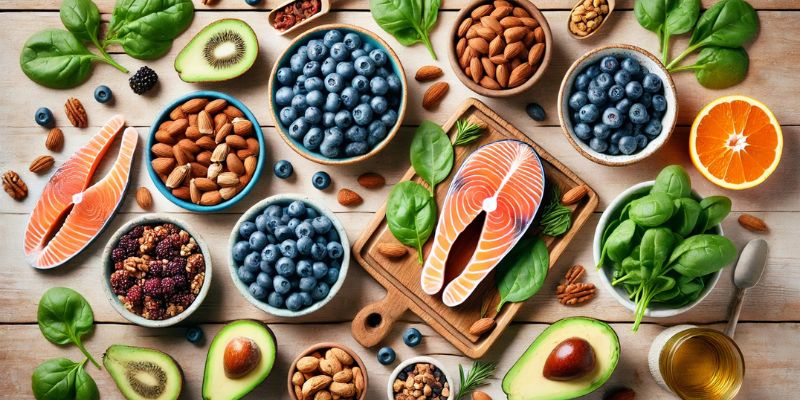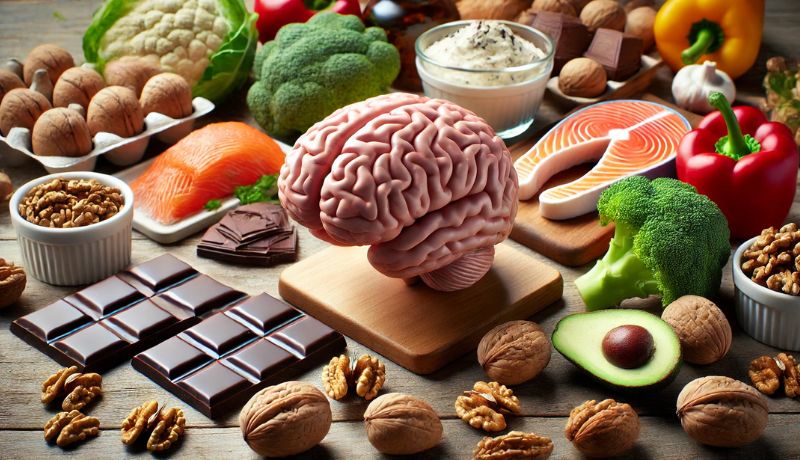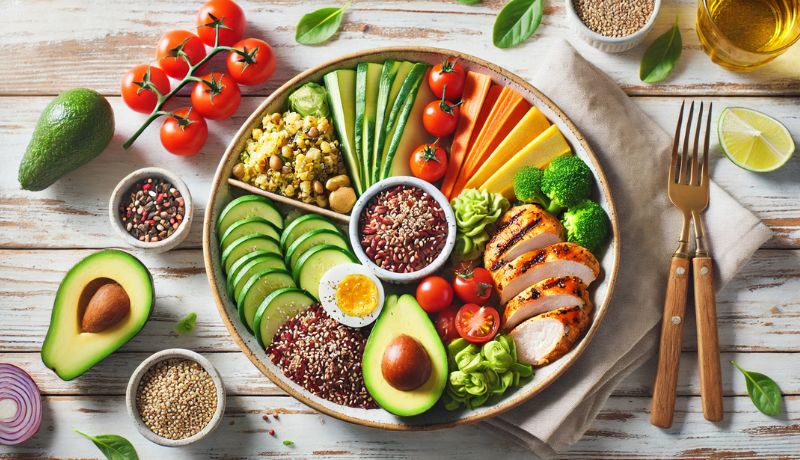
We often think of productivity as a result of good time management, discipline, and focus—but what if the secret to peak performance lies in what’s on your plate?
The connection between nutrition and productivity is backed by science, and by making smarter food choices, you can fuel not just your brainpower but also your financial success.
In this guide, we’ll explore practical nutrition hacks that boost energy, sharpen focus, and help you make smarter financial decisions.
Unveiling Nutrition’s Role in Boosting Productivity
1️⃣ The Science Behind the Link Between Nutrition and Cognitive Function

Your brain is a high-performance machine that consumes around 20% of your body’s energy despite making up only about 2% of your body weight. The fuel it uses comes directly from the food you eat.
Studies have shown that nutrient-rich foods improve cognitive function, memory, and focus, while processed foods high in sugar and unhealthy fats can lead to sluggish thinking and fatigue.
When you nourish your body with the right foods, you enhance:
☑ Neuroplasticity – The brain’s ability to adapt and grow, essential for learning and problem-solving.
☑ Neurotransmitter production – Chemicals like dopamine and serotonin that regulate mood and motivation.
☑ Oxygen and blood flow – Proper circulation supports alertness and mental clarity.
2️⃣ Key Nutrients That Enhance Brain Performance
If you want to stay sharp and productive, focus on incorporating these essential nutrients:
☑ Omega-3 Fatty Acids – Supports brain structure and function. Found in fatty fish like salmon and walnuts.
☑ Antioxidants – Combat oxidative stress that can damage brain cells. Found in berries, dark chocolate, and green tea.
☑ B Vitamins – Vital for energy production and cognitive performance. Found in leafy greens, eggs, and whole grains.
☑ Magnesium – Supports nerve function and reduces stress. Found in almonds, spinach, and avocados.
3️⃣ Brain-Boosting Foods to Add to Your Diet
To keep your brain firing on all cylinders, include the following superfoods in your daily routine:
☑ Blueberries – Packed with antioxidants that delay brain aging.
☑ Avocados – Loaded with healthy fats that promote brain health.
☑ Leafy Greens – High in vitamin K, which enhances memory and focus.
☑ Fatty Fish – Rich in DHA, a type of omega-3 essential for cognitive function.
☑ Dark Chocolate – Contains flavonoids that boost blood flow to the brain.
4️⃣ The Impact of a Balanced Diet on Energy Levels and Focus
A balanced diet prevents the dreaded afternoon slump and keeps your energy levels stable. Consuming too many refined carbs and sugary snacks can lead to rapid spikes and crashes in blood sugar, making it harder to stay focused.
On the other hand, a diet rich in whole foods, fiber, and protein provides sustained energy, keeping you alert and productive.
Meal Planning Hacks for Financial Success
1️⃣ Strategic Grocery Shopping to Save Money and Eat Healthily

Meal planning isn’t just about convenience—it’s a strategic way to control your budget while ensuring you eat nutritious meals. Here’s how to make the most of your grocery trips:
☑ Plan Meals Around Seasonal Produce – Seasonal fruits and vegetables are often fresher, more nutritious, and significantly cheaper.
☑ Create a Weekly Menu – Stick to a list to avoid impulse buys and overspending.
☑ Shop in Bulk – Purchase pantry staples like grains, legumes, and nuts in bulk to save money over time.
☑ Opt for Frozen Options – Frozen fruits and vegetables retain most of their nutrients and often cost less than fresh alternatives.
2️⃣ Batch Cooking Recipes That Optimize Time and Resources
Batch cooking is a game-changer for busy professionals who want to eat well without spending hours in the kitchen. Prepare large quantities of versatile dishes that can be repurposed throughout the week, such as:
☑ Grilled Chicken and Veggie Bowls – Perfect for lunch or dinner.
☑ Chili or Stew – Easy to freeze and reheat for later.
☑ Overnight Oats or Chia Pudding – A healthy, ready-to-go breakfast option.
3️⃣ Understanding Cost-Per-Nutrient to Make Smart Purchases
When shopping for groceries, think beyond just the price tag. Focus on the cost-per-nutrient by choosing nutrient-dense foods that provide maximum health benefits per dollar. For example:
☑ Eggs – Packed with protein and healthy fats, making them a budget-friendly powerhouse.
☑ Beans and Lentils – High in fiber and plant-based protein, offering great value for money.
☑ Sweet Potatoes – A nutrient-dense, low-cost carb loaded with fiber and vitamins.
4️⃣ Leveraging Seasonal Produce for Cost-Effective Nutrition
Eating seasonally can reduce your grocery bill while improving your health. Seasonal fruits and vegetables are not only fresher but also retain more nutrients. Look for:
☑ Winter – Root vegetables, citrus fruits, and leafy greens.
☑ Spring – Asparagus, peas, strawberries, and radishes.
☑ Summer – Tomatoes, zucchini, berries, and melons.
☑ Fall – Pumpkins, squash, apples, and Brussels sprouts.
Balancing Macro and Micro Nutrients for Peak Performance
1️⃣ The Role of Macronutrients in Energy Balance

To fuel your body effectively, aim for a balance of:
☑ Proteins – Build and repair tissues, keep you full longer, and stabilize blood sugar. Include lean meats, legumes, and plant-based protein sources.
☑ Fats – Provide long-lasting energy and support brain health. Opt for healthy fats from avocados, olive oil, and nuts.
☑ Carbohydrates – Fuels your brain and muscles. Focus on complex carbs like quinoa, brown rice, and sweet potatoes.
2️⃣ Identifying Essential Micronutrients for Productivity
Micronutrients play a crucial role in maintaining peak cognitive and physical performance. Deficiencies can lead to fatigue, brain fog, and decreased focus. Be sure to include:
☑ Iron – Prevents fatigue and supports oxygen transport. Found in lean meats, spinach, and legumes.
☑ Vitamin D – Boosts immunity and mood. Sourced from sunlight exposure and fatty fish.
☑ Zinc – Supports immune function and mental clarity. Found in seeds, shellfish, and poultry.
3️⃣ How Nutrient Deficiencies Can Affect Work Efficiency
Deficiencies in critical nutrients can significantly impact your productivity. For instance:
☑ Iron deficiency can lead to fatigue and brain fog.
☑ Low magnesium levels may cause poor concentration and irritability.
☑ Vitamin B12 deficiency affects energy production and mental clarity.
4️⃣ Practical Tips for Achieving Nutritional Balance
To maintain a balanced diet without overcomplicating your routine:
☑ Follow the 80/20 Rule – Aim for 80% whole, nutrient-dense foods and 20% indulgent choices.
☑ Portion Control – Use your plate as a guide: 50% vegetables, 25% protein, and 25% carbs.
☑ Diversify Your Diet – Rotate different fruits, vegetables, and protein sources to ensure a variety of nutrients.
Incorporating Mindful Eating for Sustained Motivation
1️⃣ The Philosophy and Benefits of Mindful Eating

Mindful eating is about being fully present while you eat, paying attention to hunger and fullness cues, and savoring each bite.
Studies suggest that practicing mindful eating can improve digestion, reduce overeating, and enhance overall well-being.
2️⃣ Creating a Distraction-Free Eating Environment
A chaotic eating environment can lead to mindless snacking and overconsumption. To cultivate mindful eating habits:
☑ Turn Off Screens – Avoid eating while watching TV or scrolling through your phone.
☑ Set the Table – Create a calm atmosphere that encourages you to focus on your meal.
☑ Chew Slowly – Savor the flavors and textures of your food, giving your brain time to register fullness.
3️⃣ Listening to Your Body: Recognizing Hunger and Fullness Cues
Pay attention to your body’s signals by:
☑ Eating When Hungry, Not Bored – Differentiate between true hunger and emotional eating.
☑ Stopping at 80% Full – Aim to feel satisfied, not overly stuffed.
4️⃣ Long-Term Impacts of Mindful Eating on Productivity and Financial Health
Mindful eating not only enhances productivity by preventing energy crashes but also promotes better financial decisions. When you’re in tune with your body’s needs, you’re less likely to overspend on impulse purchases or junk food that drains both your wallet and energy.
Frequently Asked Questions (FAQs)

❓1. What foods improve focus and concentration?
Foods rich in omega-3 fatty acids, antioxidants, and B vitamins enhance cognitive function and focus. Incorporate foods like fatty fish, blueberries, leafy greens, and dark chocolate to keep your brain sharp.
❓2. How does meal planning save money and improve nutrition?
Meal planning helps you stick to a grocery list, avoid impulse purchases, and reduce food waste. It also ensures you make nutrient-dense choices while keeping your budget in check.
❓3. Is batch cooking an effective way to save time and money?
Absolutely! Batch cooking allows you to prepare large quantities of versatile meals, saving both time and money. Dishes like chili, grilled chicken bowls, and overnight oats can be repurposed throughout the week.
❓4. What is mindful eating, and how does it impact productivity?
Mindful eating involves being present and fully aware of your eating habits. It helps you listen to your body’s hunger and fullness cues, preventing overeating and boosting long-term energy and productivity.
❓5. Can nutrient deficiencies affect work efficiency?
Yes, deficiencies in iron, magnesium, and B vitamins can cause fatigue, brain fog, and poor concentration, ultimately affecting work performance. A balanced diet prevents these deficiencies and supports sustained productivity.
Final Thoughts: Fuel Your Success One Bite at a Time
Boosting your productivity and financial success doesn’t require drastic changes—just smarter choices.
By focusing on nutrient-rich foods, planning your meals wisely, balancing macros and micros, and practicing mindful eating, you create a sustainable framework for a healthier body and a sharper mind. And as your productivity soars, so does your ability to make better financial decisions, paving the way for long-term success.
Start today by making small adjustments to your diet, and watch how these nutrition hacks transform both your performance and your bottom line!

I’ve personally experienced a noticeable improvement in both my productivity and overall well-being after adjusting my diet to focus on nutrient-dense foods. Simple changes, like incorporating more protein and healthy fats into my meals, have helped me maintain steady energy levels throughout the day.
I’ve also found that staying hydrated is often overlooked, but it plays a huge role in maintaining focus. It’s interesting how nutrition not only supports physical health but also contributes to mental clarity, which is essential for financial success.
Finding the right balance of food has been key for me in sustaining productivity over long hours of work.
These are sources of a wealth of information for eating healthy and boosting brain function everyday.
I love that mindset of mindful eating, especially if you listen to inspiring music and eating slowly, savoring your food, it will truly make your day, especially if you eat breakfast at the start of your day.
These are great information and inspirational.
Marita
Thank you so much, Marita! I’m really glad the post resonated with you.
Mindful eating truly complements the nutrition hacks I shared—like starting the day with a brain-boosting breakfast, staying hydrated, and fueling with balanced meals. Pairing those habits with a calm, intentional mindset (and a little inspiring music!) is such a powerful way to boost focus and productivity.
It’s amazing how those small daily choices can ripple into better financial decisions and long-term success.
Appreciate your thoughtful comment!
Hi Slavisa,
Thank you for sharing your personal experience! It’s encouraging to hear how focusing on nutrient-dense foods has positively impacted your productivity and overall well-being.
Your approach of incorporating more protein and healthy fats aligns well with the strategies discussed in the article, emphasizing the importance of balanced macronutrients for sustained energy.
You’re absolutely right about the often-overlooked role of hydration. Maintaining adequate fluid intake is crucial for cognitive function and focus, which are essential for both personal and financial success.
Your journey underscores the article’s message: that mindful nutrition choices can enhance not just physical health, but also mental clarity and productivity. It’s inspiring to see how these changes have contributed to your sustained work performance.
Thank you again for your thoughtful contribution!
Warm regards,
Alice